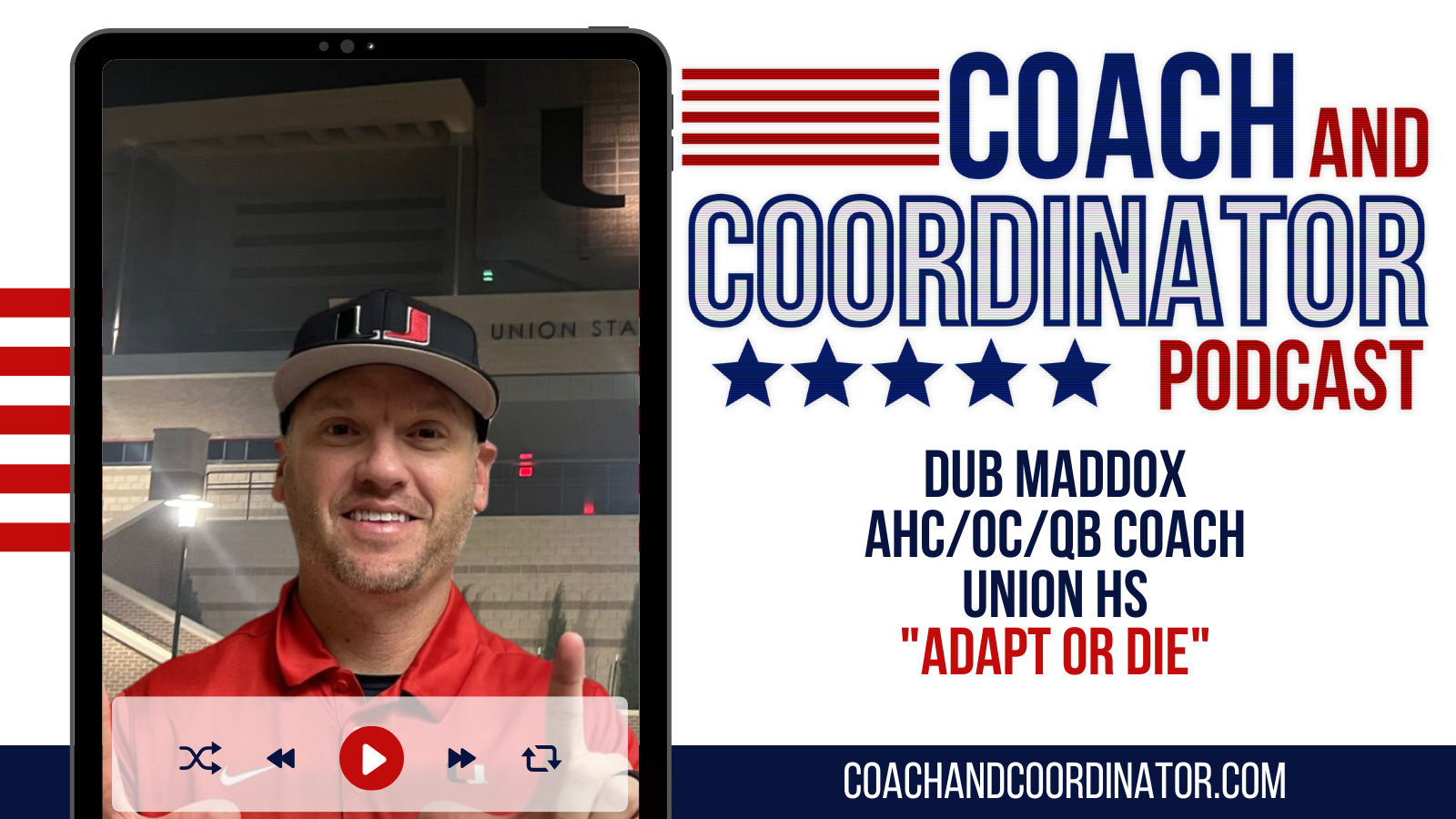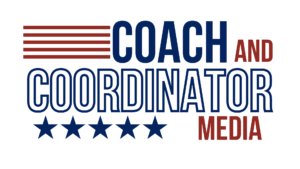
In this episode, revisited from our archives, Dub Maddox shares lessons learned from his study of adaptations of the U.S. Military and how they are applied to football to identify and account for non-negotiables, edit the paradox of choice, implement brevity language, and install sequential processes to remain ahead of the opponent.
Listen On:
“We’re able to pare back and do more with less with a common language and a process of the progression platform.”
– Dub Maddox
Dub Maddox is the offensive coordinator at Union High School in Tulsa, Oklahoma. He previously served for 13 years as offensive coordinator at national powerhouse Jenks High School.
Coach Maddox is one of the great thinkers and football minds in the game. Our host Keith Grabowski has personally picked up significant knowledge from Coach Maddox over the years, frequently recollecting a 2010 visit to sit down and talk ball. That visit solidified how Coach Grabowski thought about how he could bring his receivers and protections together with his quarterback progressions to improve the passing game. There are countless examples of Dub Maddox sharing his insights for the betterment of the game.
In this episode, Coach Maddox shares a few of those insights. He is an avid student of ideas from industries outside of football. And here, he relays best practices of the U.S. Military and how he applies them to football.
Follow Dub Maddox on Twitter @CoachDubMaddox.
“We’ve created a language that’s a brevity language… Now we can say more with less, and we can understand more with less.”
– Dub Maddox
Show Notes:
>Lessons from the United States Military
>Non-Negotiables: Space, Time, and Talent
>Breaking Down the RPO
>Getting Players to Understand the Game Plan
>Creating a Specialized Language to Help Players
>Letting Your Players Know When to Adjust
>Overview of Adapt or Die
Related Resources:
Harvard Business Review article: “The Best Ideas Come from Outside Your Industry”
Free Download of Question Set to Inventory Your Offense
Dub Maddox’s Book Adapt or Die
Additional Dub Maddox Episode:
The Winning Edge – Takeaways and Ideas for Implementation:
1) Build an Operating System for Your Offense
Dub Maddox talks about how the wing-t offense is built around a structure and series of answers. What he’s done is taken that concept and evolved it into a platform for putting together a game plan and calling plays. He has even built in codes for his players to use to get them to different parts of those progressions on the fly. In today’s world, which has overwhelmed us with information, we need to look for structure within what we do. Otherwise, we will be left with a grab bag of plays and no rhyme or reason for calling them. What Dub has put together is worth studying.
It’s also worth going back to books like Tubby Raymond’s Delaware Wing-T: An Order of Football, Tiger Ellison’s Run and Shoot Football: The Offense of the Future, or Homer Smith’s self-published series of manuals. These old books are rich on football theory and provide insight into thought processes. Dub Maddox’s book Adapt or Die gives us a modern iteration of football theory and methods.
It’s not about running any of the offenses in the old books. It’s about having a theory and strategy for all the plays you have learned and put into your playbook so that there is a framework for how to operate that offense, including planning, practice, play calling, and performance on game day.
2) Simplify Your Language
Language is the most powerful tool you have as a teacher and coach. Used properly, it crystalizes concepts with an efficiency that communicates much with little. I always recommend putting all of your terminology up on the whiteboard and seeing the structure you have created. We did it anytime I took over an offense or moved to a new program to understand what our players were communicating before as well as how efficient and effective our terminology was.
It begins a useful conversation about how we can attach more meaning or simplify learning, as well as eliminate redundancies that become confusing for the players or us. Once you look at all you have, I guarantee you will find a way to improve it, which will enhance player learning and understanding, and oftentimes, help the coaches have a clear picture of the offense and its strategy as well.
3) Incorporate Best Practices from Industries Outside Football
Step outside of football and learn from other industries. Dub studied the military to help him streamline what he does on offense. Yes, you should keep learning the game, but creativity and innovation can come from looking outside of the game or even athletics. Harvard Business Review did a study in which they conducted standardized interviews with the participants, presenting the problem of lack of safety and gear compliance as it pertained to each of the fields.
Essentially, they asked how roofers’ safety belts, carpenters’ respirator masks, and skaters’ knee pads could be redesigned to increase their comfort and use. They gave the participants a few minutes to suggest solutions, collected the responses, then had a panel of experts evaluate the suggestions on novelty and usefulness. Each group was significantly better at thinking of novel solutions for the other fields than for its own.
We need to get ideas from multiple places, not just within our profession if we truly want to grow and develop ourselves as coaches, our schemes and strategies, and our programs.


